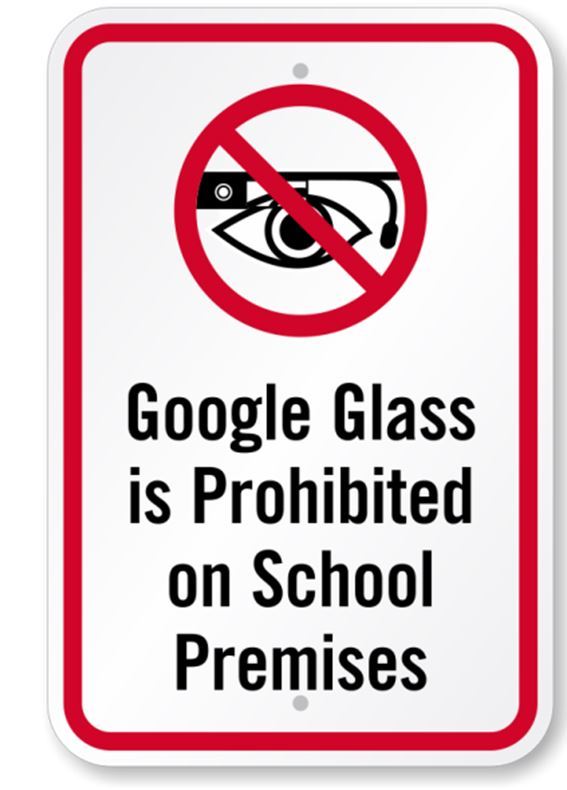
Technology is like toothpaste -- once it's out of the tube, it's nearly impossible to put it back in. With industry giants like Google and Apple pumping out product after attention-grabbing product, sometimes it feels like the pace of new gadgets outstrips our ability to adapt.
Similarly to when students were initially barred from using handheld calculators in exams in the 1970s, we're seeing resistance to the incipient intrusion of Google Glass on our everyday lives. When I last wrote about Google Glass, I brought up several "stranger danger" and privacy concerns:
•Predators will be able to subtly snap photos of children in public places
•Students will be able to use surreptitiously gathered videos and pictures to harass peers
•The "big data" problem of unwanted surveillance
Some people think Google Glass is just a more complicated cell phone -- you have the ability to secretly record or snap photos of people with most camera phones, so what's the big deal? PolicyMic has detailed three major differences between cell phones and Glass, and how the new technology might affect you when Glass goes into wide release in late 2013 or early 2014. (One ominous development: Glass will be able to contribute to and draw on personal data without conscious permission by tracking "eye movements and [making] data requests based on where you're looking," potentially giving Google more information about your preferences and desires than you have conscious access to yourself.)
As with most technology, though, it's not all storm clouds -- there's a lot of silver lining, too.
For example, Catalin Voss, a freshman at Stanford, recently stumbled upon a use for an educational app he designed. The app, Sension, helps children on the autistic spectrum with social and emotional skills training by using Google Glass's camera to identify and interpreting facial expressions, registering other people's emotional states on the heads-up display. According to a Huffington Post article, "...an autistic user wearing Google Glass with Sension could interact with others while being alerted to their social cues."
So while Sension represents Glass's tremendous upside, there's a dark side, too. Scroll down to the 22nd argument in this series of 35 arguments against Google Glass: it opens the door to more cyberbullying. With existing "remote administration tool technology," hackers can access webcams. While that's already scary, instead of being able to stream a stationary feed of a laptop webcam, a Google Glass security breach could provide hackers with a mobile set of eyes. Whether or not a privacy hack occurs, the potential to do so understandably concerns parents, schools and teenagers.
Schools must consider whether or not Glass should be permitted on their grounds (image from MyDoorSign)
As Glass enters our society, we need to be sure that us as parents understand the anticipated effects on safety and privacy. Although we can't control others' behavior, we can be social media role models for our kids. That involves relaying proper etiquette of using the technology, talking over limits with your children, and emboldening your community to be assertive when necessary.
1) Be in the know and teach your kids Glass etiquette
It's crucial for your children to know how to conduct themselves when they're around a Google Glass user. Since the device hasn't gone mainstream yet, it's tricky to base suggestions upon actual scenarios; unfortunately, teasing out the technology's harmful potential will take time, but sites such as CyberWise provide an excellent beginner-to-advanced level digital media learning hub for parents. Take opportunities to test your knowledge with a quiz, too.
2) Set boundaries
Whether it's a nighttime curfew, borrowing the keys to the car or allowing spending, parenting involves setting limits of all kinds. If you don't feel comfortable with your child using or being around Google Glass, talk over what boundaries with your kids, explaining the potential consequences of other people's misuse of the technology and how it could affect them personally. Much of the relationship we build with our children is based on trust and respect, and this conversation will build on those.
3) It takes a village -- make Google Glass awareness a community priority
Encourage your community to restrict Google Glass in sensitive zones, like schools, gyms, locker rooms, bathrooms, beaches and pools. Owners and proprietors should be encouraged to make their own rules for their own property. In the same way that cities make roads safer by using speed cameras and signs to discourage irresponsible driving, we can use reminders like signs to let the public know that wearable recording devices just aren't appropriate in some places.
Takeaway tips:
•86 percent of Internet users have taken steps online to remove or mask their digital footprints. Regardless, whatever you post online is up there for good. Remind yourself and your children that there is no digital rewind button.
•Emphasize to your kids that technology is much more powerful when it's used for good rather than bad. Challenge them to brainstorm ways to use technology constructively.
•Google Glass is just the beginning of a wave of wearable technology devices. Let's be prepared rather than left in the dust.
